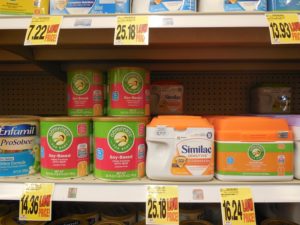Q: “I have a two week old and my milk supply is dwindling quickly despite pumping every three hours. We are supplementing with formula, and will likely, despite many tears, be needing to switch to formula full time. I need help and would love the download on formula! There are so many choices and very little information on how do I choose the best for my baby? How often and how much to feed a newborn? Also, any other general tips? Thanks!”
A: First off, you are not alone!!! There is so much stigma for moms when breastfeeding does not work out and sadly there are not a lot of resources for mothers who need to turn to formula from breastfeeding. Just like breastfeeding, through formula feeding and feeding your baby period, you are building a loving relationship. You are an amazing mother and your have such great questions! Unfortunately, they do not have universal answers. But we will do the best we can to give you the highest quality information to support you make the best decisions for your baby!
Choosing a Formula
The simple answer is that it is specific to you and your baby. All formula manufacturers have to comply with the same very specific guidelines. There is no evidence that proves that one brand of formula is better than  another. When seeking a formula or introducing a formula the biggest factors will be cost and diet preference/allergies. If your baby has an intolerance or allergy to dairy than that will direct you towards non-dairy based formulas. If it is important to you and your family to have an organic non-gmo formula than that will cancel out some options. If neither of those apply to you or your baby than perhaps you have a limited budget on what you can spend on formula. Whether you are solely formula feeding or supplementing these are factors to take into consideration when weighing out which formula may be best.
another. When seeking a formula or introducing a formula the biggest factors will be cost and diet preference/allergies. If your baby has an intolerance or allergy to dairy than that will direct you towards non-dairy based formulas. If it is important to you and your family to have an organic non-gmo formula than that will cancel out some options. If neither of those apply to you or your baby than perhaps you have a limited budget on what you can spend on formula. Whether you are solely formula feeding or supplementing these are factors to take into consideration when weighing out which formula may be best.
How Much Formula Should I Be Feeding My Baby?
In the first few days and weeks of your baby’s life your formula fed newborn will need about 2-3 ounces (60-90 ML) of formula per feeding and will eat every three to four hours on average. By the end of your baby’s first month, they would be up to at least 4 ounces (120 ml) per feeding about every four hours. By six months, your baby will consume 6 to 8 ounces (180–240 ml) at each of four or five feedings in twenty-four hours.
On average, your baby should take in about 2.5 ounces (75 ml) of formula a day for every pound (453 grams) of body weight. But your baby will regulate his/her intake from day to day to meet his/her own specific needs. It’s important to pay attention to their feeding cues, especially in those first few days and weeks. Rather than getting fixated on specific amounts and times, pay attention to what your baby is telling you. Are they acting fussy after a feeding? Are they still opening and closing their mouth or suckling their hands? Those are often signs your baby may still be hungry.
As you formula feed your baby or supplement always feel free to reach out to your pediatrician to check in on your baby’s weight and what their recommendations may be.
Tips for Bottle Feeding
 Sit your baby upright while bottle-feeding. Holding your baby upright can assist in their digestion and not overwhelm your baby with the bottle having too strong of a flow (hold the bottle more level rather than pour into baby’s mouth).
Sit your baby upright while bottle-feeding. Holding your baby upright can assist in their digestion and not overwhelm your baby with the bottle having too strong of a flow (hold the bottle more level rather than pour into baby’s mouth).- Baby-led Bottle Feeding: Start by placing the nipple of the bottle against your baby’s top lip. Wait for your baby to open up before putting the bottle in his mouth. Not forcing a bottle into a baby’s mouth. If your baby starts to show any signs of stress (milk spilling out of mouth, turning head away, pushing bottle away) then your baby may need a break.
- Give your baby breaks while bottle-feeding. During feeding sessions take breaks every few minutes to allow your baby to digest and get a burp out…mimicking breastfeeding. Occasionally bottle fed babies can be more gassy because they are taking in more air with a bottle or being overfed during feedings.
- Find a bottle nipple that works for your baby. Try out a few different bottle nipples to see which work best for your baby. Sticking to a slow flow especially for your newborn. Locally you can check out The Littlest Birds to see a variety of bottles/nipples that may fit your baby’s needs.
 Just like breastfeeding through formula feeding and feeding your baby period you are building a relationship. Every baby is different. What worked for your friends baby may not be what’s best for yours. Try to let any comparison that may come up between you and other families fall to the wasteside. We at Homegrown Babies know that all families choices in pregnancy, birth, postpartum and parenthood matter. There’s vivid bravery in doing what’s best for the health and wellbeing of not only your baby but for yourself (as a mother and parent).
Just like breastfeeding through formula feeding and feeding your baby period you are building a relationship. Every baby is different. What worked for your friends baby may not be what’s best for yours. Try to let any comparison that may come up between you and other families fall to the wasteside. We at Homegrown Babies know that all families choices in pregnancy, birth, postpartum and parenthood matter. There’s vivid bravery in doing what’s best for the health and wellbeing of not only your baby but for yourself (as a mother and parent).
Resources for Choosing/Using Formula
Kellymom.com – What I should know about choosing a Formula?
Gimme The Good Stuff – Safe Formula Guide
Dr. Sears – askdrsears.com
Support Groups and Community Resources
Mother with Courage
Mondays 11 a.m. – 12:30 p.m. (general topics, mom-to-mom support)
4th Monday of each month – 5:30 – 7 p.m. – specifically for moms feeling the more challenging side of motherhood and those with postpartum depression, anxiety, OCD.
Weekend Edition – one Saturday a month (check our calendar!) Similar to the weekly group but available on the weekend for moms working outside the home or those that need an extra dose of MWC!

